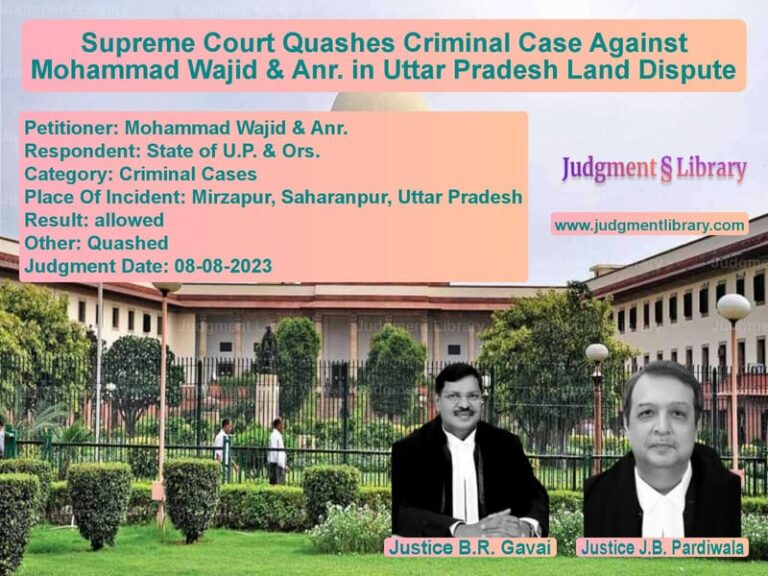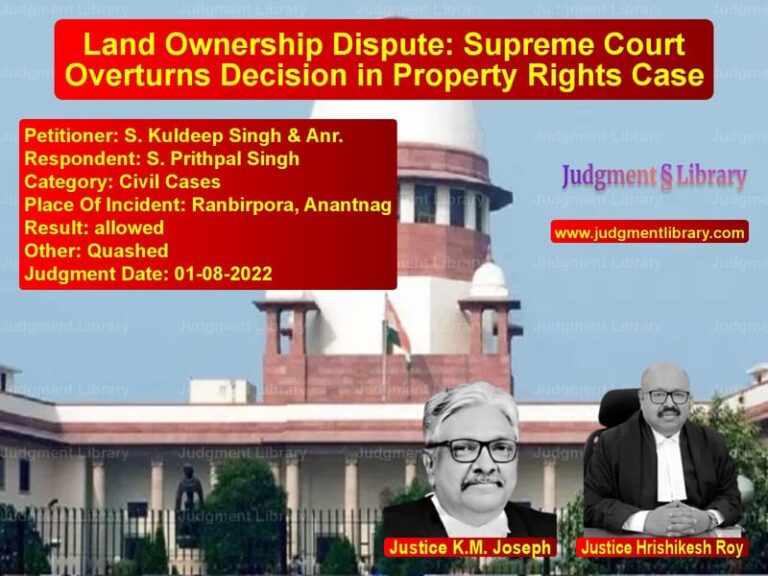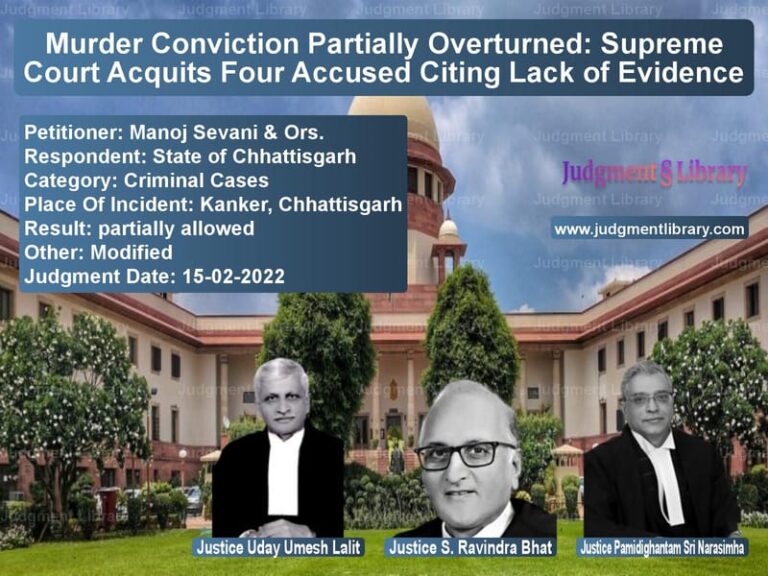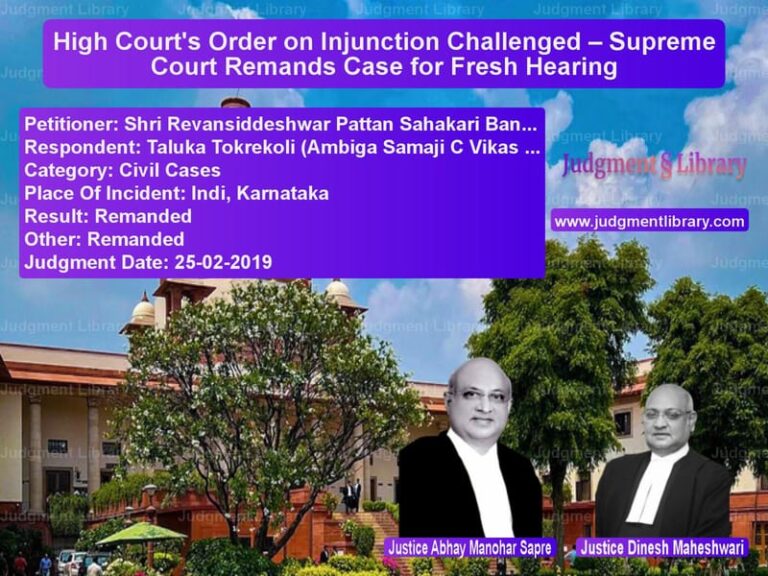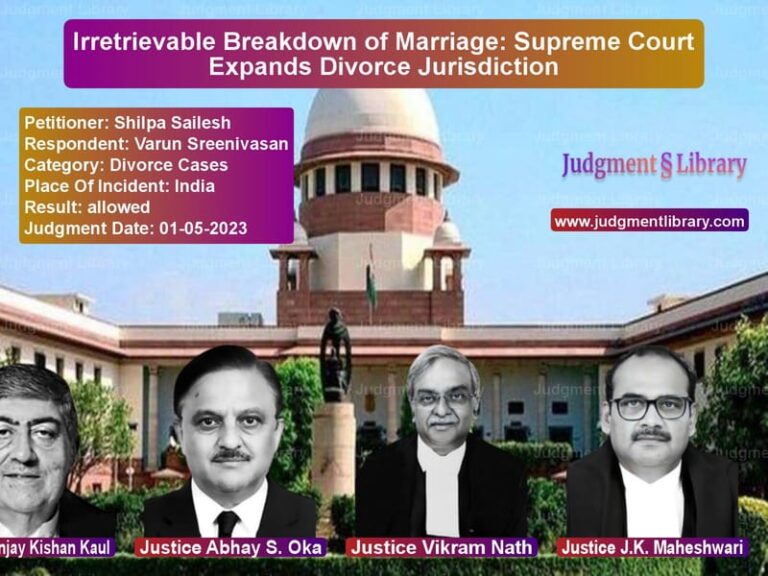Supreme Court Clears Tax Official of Misconduct in Flipkart VAT Dispute
The case of Chandra Prakash Mishra vs. Flipkart India Private Limited & Others revolves around the Uttar Pradesh VAT dispute concerning Flipkart’s tax assessment. The Supreme Court examined whether adverse remarks made by the Allahabad High Court against a tax officer were justified, ultimately setting aside the observations.
This judgment is significant as it clarifies the principles regarding judicial strictures against public officers and the limitations of courts in passing adverse remarks without personal hearings.
Background of the Case
The case involved the assessment of VAT liability for Flipkart India Private Limited in Uttar Pradesh. The key events in the case are as follows:
- 2013: Flipkart applied for a change of registered business address from Noida to Ghaziabad.
- 2014: The application was rejected by the Registering Authority.
- 2015: An ex-parte tax assessment order was issued by Deputy Commissioner Chandra Prakash Mishra.
- 2016: Flipkart challenged the assessment before the Allahabad High Court.
- February 29, 2016: The High Court ruled in favor of Flipkart, quashed the assessment order, imposed a penalty of Rs. 2 lakh on the tax department, and ordered an inquiry against the tax officer.
- May 4, 2016: A fresh assessment order was passed despite the High Court ruling.
- August 2, 2016: The High Court imposed another penalty of Rs. 50,000 on the tax officer and directed departmental action.
- March 30, 2022: The Supreme Court ruled on the tax officer’s appeal.
The tax officer, Chandra Prakash Mishra, argued that he was performing his official duties in good faith and that the High Court’s remarks against him were unfair.
Legal Issues Considered
- Whether the High Court exceeded its jurisdiction in passing adverse remarks against the tax officer.
- Whether the officer was acting in good faith under the Uttar Pradesh VAT Act.
- Whether the imposition of personal penalties was justified.
- Whether the High Court had the authority to recommend disciplinary action against the officer.
Petitioner’s Arguments (Chandra Prakash Mishra)
- The tax officer acted in accordance with the registered business address available in records.
- The application for a change of address was filed 11 months late and had been rejected by the competent authority.
- The officer attempted to serve notices both in Noida and Ghaziabad before passing an ex-parte order.
- The High Court imposed costs and strictures without giving the officer an opportunity to be heard.
Respondent’s Arguments (Flipkart India Private Limited)
- The tax officer knowingly passed an illegal ex-parte order despite being aware of the company’s shift to Ghaziabad.
- The tax officer did not properly serve notices before assessing taxes.
- The High Court was justified in imposing penalties as a deterrent to maladministration.
- The officer continued proceedings even after the High Court’s ruling, defying judicial orders.
Supreme Court’s Judgment
The Supreme Court bench, comprising Justices Dinesh Maheshwari and Aniruddha Bose, ruled in favor of the tax officer and set aside the High Court’s strictures.
1. High Court Overstepped Its Jurisdiction
“The High Court, while passing strictures, did not provide the officer an opportunity of being heard.”
The Supreme Court ruled that personal penalties cannot be imposed without due process.
2. Tax Officer Acted Within His Jurisdiction
“The tax officer proceeded based on the registered address in official records.”
The Court held that the officer’s actions were based on existing records and were not malicious.
3. No Evidence of Bad Faith
“An erroneous decision does not imply malafide intent.”
The Court ruled that errors in official decisions do not automatically indicate misconduct.
4. Personal Penalties Revoked
“The costs imposed by the High Court are set aside.”
The Supreme Court ruled that the penalties imposed on the tax officer should be annulled.
Key Takeaways from the Judgment
- The Supreme Court reaffirmed that judicial strictures must follow due process.
- Officials acting within their jurisdiction should not be penalized unless malafide intent is established.
- The ruling ensures that tax officers can perform their duties without fear of unjustified personal penalties.
- Courts should exercise restraint when issuing adverse remarks against public officers.
Implications of the Verdict
This ruling has significant implications for tax administration and judicial oversight:
- Tax officers can follow legal procedures without fear of unwarranted personal liability.
- Judges must ensure that adverse remarks are justified and not issued casually.
- The decision strengthens judicial accountability and fairness in tax assessments.
Overall, this Supreme Court ruling ensures that public officers performing statutory duties are protected from unfair judicial remarks and penalties, reinforcing the principles of natural justice.
Petitioner Name: Chandra Prakash Mishra.Respondent Name: Flipkart India Private Limited & Others.Judgment By: Justice Dinesh Maheshwari, Justice Aniruddha Bose.Place Of Incident: Noida, Uttar Pradesh.Judgment Date: 29-03-2022.
Don’t miss out on the full details! Download the complete judgment in PDF format below and gain valuable insights instantly!
Download Judgment: chandra-prakash-mish-vs-flipkart-india-priva-supreme-court-of-india-judgment-dated-29-03-2022.pdf
Directly Download Judgment: Directly download this Judgment
See all petitions in Income Tax Disputes
See all petitions in Tax Refund Disputes
See all petitions in Banking Regulations
See all petitions in Judgment by Dinesh Maheshwari
See all petitions in Judgment by Aniruddha Bose
See all petitions in allowed
See all petitions in Modified
See all petitions in supreme court of India judgments March 2022
See all petitions in 2022 judgments
See all posts in Taxation and Financial Cases Category
See all allowed petitions in Taxation and Financial Cases Category
See all Dismissed petitions in Taxation and Financial Cases Category
See all partially allowed petitions in Taxation and Financial Cases Category


